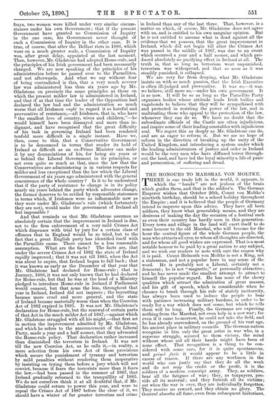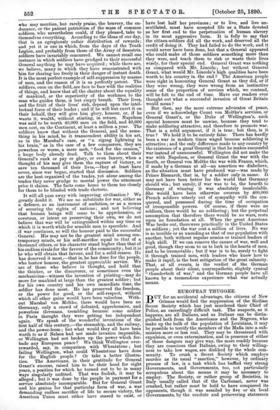THE HONOURS TO MARSHAL VON MOLTKE. T HERE is one trade
left in the world, it appears, in which the " hands " are notjealous of the brain which guides them, and that is the soldier's. The German Emperor wishes that October 26th, Count von Moltke's ninetieth birthday, should be a school holiday throughout the Empire ; and it is believed that the people of Germany intend to improve upon this advice. They have all been soldiers, they know what generalship means, and they are desirous of making the day the occasion of a festival such as even their country has hardly seen in this generation. Every town and village in the land will exert itself to do some honour to the old Marshal, who will become for the hour the central figure of the whole German people, the man who attracts all eyes, to whom all thoughts are directed, and for whom all good wishes are expressed. That is a most notable honour to be paid by a great nation to any subject, and we wish our readers to note with care the reason why it is paid. Count Helmuth von Moltke is not a King, not a statesman, and not a popular hero in any sense of the word. He is probably not a Liberal, certainly not a democrat ; he is not " magnetic," or personally attractive ; and he has never made the smallest attempt to attract to himself the popular regard. He has none of the showy qualities which attract the admiration of great masses, and his gift of speech, which is considerable when he chooses to break through his rule of stately taciturnity, has always been used to induce the people to bear with patience increasing military burdens, in order to be ready for a war which does not come, but which he tells them will be long. Finally, the Germane are expecting nothing from the Marshal, not even help in a new war ; for even if it came to-morrow, he could not take the field, and he has already surrendered, on the ground of his vast age, his ancient place in military councils. The German nation recognise in him only the great artist in war who, in a supreme struggle, secured to them victory, the mind without whose aid all their hands might have been of none effect. That recognition is a thing to be con- sidered with some care, for it is quite spontaneous, and primci facie it would appear to be a little in excess of reason. If there are any workmen in the world who can justly say that they do all the work and do not reap the credit or the profit, it is the soldiers of a modern conscript army. They, as soldiers, bear all the fatigues of war ; they, as taxpayers, pro- vide all its material ; and they furnish all its victinio; yet when the war is over, they are individually forgotten. They receive no reward, and they obtain no glory. The General absorbs all fame, even from subsequent historians, who may mention, but rarely praise, the bravery, the en- durance, or the patient patriotism of the mass of common soldiers, who nevertheless could, if they pleased, take to themselves everything. According to the ideas of our day, that is an egregiously unfair distribution of rewards ; and yet it is one in which, from the days of the Tenth Legion, and probably from those of the Army of Sesostris, soldiers have invariably concurred. We cannot recall one instance in which soldiers have grudged to their successful General anything he may have acquired ; while there are, we believe, many in which they have remonstrated with him for sharing too freely in their danger of instant death. It is the most perfect example of self-suppression by masses of men, and the reason of it is as perfectly patent. The soldiers, once on the field, are face to face with the realities of things, and know that all the chatter about the equality of mankind, or the superiority of the workmen to the man who guides them, is but empty breath. Their lives, and the fruit of their lives' risk, depend upon. the intel- lectual force of their leader ; and if he will but exert it on their behalf, they will give him glory, honour, or, if he wants it, wealth, without stinting, in return. Napoleon was said to be worth 40,000 men on the field, and 40,000 men cost, on the Continent, at least a million a year. The soldiers know that without the General, and the some- thing in his mind, be it transcendent ability in his art, as in the Marshal's case, or " a zigzag lightning in his brain," as in the case of a few conquerors, they are powerless or worse, a mere mob, "food for the cannon," a huge body already dead. Talk to them about their General's rank or pay or glory, or even luxury, when a thought of his may give them the rapture of victory, or save ten thousand of their lives,—they at least have never, since war began, started that discussion. Soldiers are the best organised of the trades, yet alone among the trades they never grudge to mental power the uttermost price it claims. The facts come home to them too closely for them to be blinded with trade rhetoric.
It will all pass away with improving civilisation ? We greatly doubt it. We see no substitute for war, either as a defence, as an instrument of ambition, or as a means of securing the rights of nations ; and not believing that human beings will cease to be apprehensive, or covetous, or intent on preserving their own, we do not believe that war will be extinguished within any time on which it is worth while for sensible men to speculate. And if war continues, so will the honour paid to the successful General. His may not be the greatest mind among con- temporary minds, or his self-sacrifice equal to that of a .:thousand others, or his character stand higher than that of his endless rivals for the favour of the community ; but it is he who will obtain that favour, and for a solid reason. He has deserved it most,—that is, he has done for the people, who bestow honour, the greatest appreciable service. We . are of those who believe in thought, and hold that the thinker, or the discoverer, or sometimes even the . mechanician—witness the invention of printing—may do more for mankind at large than the greatest soldier; but for his own country and his own immediate time, the soldier has done most. He has preserved the freedom, or the power for good, or the self-respect, without which all other gains would have been valueless. With- out Marshal von Moltke, there would have been no Germany, only a crowd of defeated, apprehensive, and powerless Germans, trembling because some soldier in Paris thought they were getting too independent again. We speak of the wonderful inventions of the first half of this century,—the steamship, and the railway, and the power-loom ; but what would they all have been worth to us if Nelson had not made invasion impossible, -or Wellington had not broken up the power which for- bade any European peace ? We think Wellington over- rewarded, say, in comparison with Wheatstone ; but failing Wellington, what could Wheatstone have done for the English people ? Or take a better illustra- tion. The Americans, in their gratitude for General Grant's success, raised him to be their head for eight years, a position for which he turned out to be in many ways singularly unfitted. That was foolish, it may be alleged ; but it was done by the people in payment for a service absolutely incomparable. But for General Grant and his genius for that particular form of war, a war demanding endless sacrifice of life to secure victory, the American Union must either have ceased to exist, or have lost half her provinces ; or to live, and live un- mutilated, must have accepted life as a State devoted as her first end to the perpetuation of human slavery in its most aggressive form. It is folly to say that the citizen-soldiers did all the work, and deserved all the credit of doing it. They had failed to do the work, and it would never have been done, but that a General appeared who could. make of those soldiers something more than they were, and teach them to risk or waste their lives wisely, for their special end. General Grant was nothing as compared with Mr. Lincoln ; but without General Grant, what would Mr. Lincoln's high qualities have been worth to his country in the end The American people were right in honouring General Grant as they did, or if they were wrong, they were wrong from an instinctive sense of the proportion of services which, we contend, will be felt to the end of time. Have our readers ever thought out what a successful invasion of Great Britain would mean ?
But then, say the more extreme advocates of peace, even if we acknowledge Count von Moltke's services, or General Grant's, or the Duke of Wellington's, such special honours must be unwise, because they tend to make soldiering attractive, and therefore to promote war. That is a solid argument, if it is true ; but then, is it true ? We hold it to be entirely false. There has hardly been a war in modern times waged because soldiering is attractive ; and the only difference made to any country by the existence of a great General is that he makes successful war instead of unsuccessful. Wellington did not make the war with Napoleon, or General Grant the war with the South, or General von Moltke the war with France, which, if made by a German at all—an assertion we disbelieve, as the situation must have produced war—was made by Prince Bismarck, that is, by a soldier only in name. It may not have been better for the world that Germany should win ; but surely, if war was to be, the benefit to Germany of winning it was absolutely incalculable. She would have been otherwise overrun by 400,000 French soldiers utterly out of sympathy with the con- quered, and possessed during the time of occupation of irresponsible powers. Of course, if there were no soldiers, there would be no soldiering ; but the perpetual assumption that therefore there would be no wars, rests upon no foundation at all. When the great American War broke out, there were practically in the United States no soldiers ; yet the war cost a million of lives. No war is so terrible or so unending as that of one population with another, both without regular armies or trained leaders of high skill. If we can remove the causes of war, well and good, though they seem to us to lurk in the hearts of men, and to be irremovable ; but if war is to be, surely to fight it through trained men, with leaders who know how to make it rapid, is the best mitigation of the great calamity. That, at all events, is the verdict of the German people about their silent, unsympathetic, slightly cynical " thunderbolt of war," and the German people have all known by a tremendous experience what war actually means.







































 Previous page
Previous page